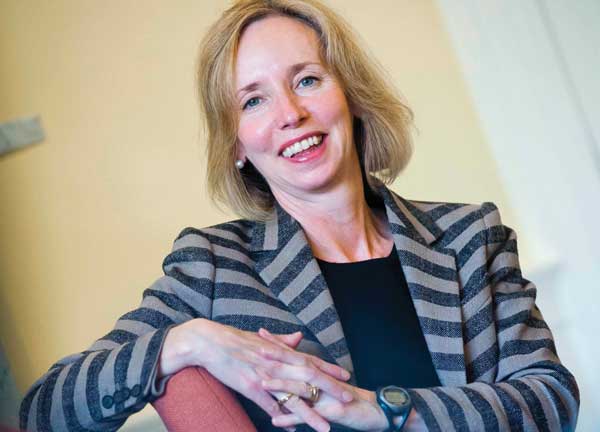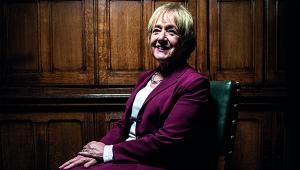
The summer sun is shining through the open windows of Caroline Gardner’s handsome Edinburgh office. Outside, the city is busying itself in preparation for the coming arts and fringe festivals. Suddenly a loud bang shatters the peace. Should I panic? Scotland’s new auditor general pauses but remains unruffled. ‘It’s just the one o’clock gun [fired in Edinburgh every day]. Nothing to worry about.’ It’s a reassuring response.
Assurance is what Caroline Gardner does best. Throughout our interview the former CIPFA president returns again and again to her professional credo: the importance of robust and transparent public finances. On a personal level, her poise and elegant composure give the impression of someone who could swiftly bring order to the most fraught and chaotic of situations.
Although English, Gardner has made Scotland her home for the past 17 years and has been on the front line of public audit throughout a period of dramatic constitutional and political change in the country, something she describes as a ‘huge privilege’.
She moved north in 1995 to set up and oversee the new NHS responsibilities of the Accounts Commission, Scotland’s local spending watchdog. But great changes to Scottish government soon came with the devolution settlement of the late 1990s and subsequent establishment of the Scottish Parliament. These new governance structures needed new audit arrangements and thus, in 2000, Audit Scotland was born. Gardner served as deputy to auditor general Bob Black until 2010. She returned to the organisation in July this year to take over from Black.
Now she’s in the ‘best of both worlds’, she says. Not only does she know Audit Scotland itself extremely well, but a break of almost two years has helped to widen her outlook. She took a 12-month secondment as chief financial officer of the Turks and Caicos Islands in the Caribbean, and then spent a period freelancing.
‘I’ve come back with a different perspective and broader experience,’ she says. She feels ‘privileged’ to be able to bring this fresh outlook to an organisation she knows and understands but which has ‘moved on’, along with Scotland itself, since she was last there. She believes this mix of change and continuity puts her in a strong position to ‘think about what we do and where we can add value in the future’.
Reflecting on Audit Scotland’s contribution to public life over the past 12 years, she highlights the fact that the organisation has helped push transparency and accountability much higher up the political agenda. Before Audit Scotland there had been no systematic way of looking at public spending and few Scottish issues drew the interest of the Commons Public Accounts Committee.
Looking forward, she picks out the ‘twin challenges’ of budget reductions and the next phase of Scotland’s constitutional debate, as it considers whether it should push for greater devolution or become an independent nation. Things are already changing with the passage of the Scotland Act, which grants more financial autonomy to the nation, giving it powers to vary income, property and waste taxes. While the auditor general is obliged to take no part in the politics of the debate, she adds that it’s important that it is informed by a sound understanding of Scotland’s public finances.
‘We know that the public finances will be a key issue both for those who are in favour of independence and for those who are against it and there will be all sorts of temptations on both sides to position the figures in the most favourable light,’ Gardner says.
‘Our job is to continue to play that role of providing expert impartial evidence of what the public finances look like now, what the sustainability questions look like, what future trends are going to have an effect on all of that. But to be able to do that, we have to be independent of the pros and cons of independence or devo-max or anything else.’
Getting an understanding of the importance of good financial management and the way it can affect every aspect of society ‘is at the heart of what I want to achieve as auditor general’, she adds. Setting a clear direction, communicating consistently and professionally and protecting Audit Scotland’s reputation as an independent guardian of public finances are the goals she has set for herself.
Gardner describes auditors’ expertise and impartiality as their ‘crown jewels’. ‘If we put them at risk we can’t play the role that we need to. A legacy that Bob Black left us after his term as auditor general was a really strong reputation for independence and expertise and it’s my job to continue that and reshape it for the next decade.’
So what does she make of the changes to public audit taking place in England? The Audit Commission’s internal audit practice is being broken up and the work shared out among private firms. Once the legislation has been passed, local authorities will be able to appoint their own auditors. Bob Black had some trenchant things to say about the proposals earlier this year, likening the plans to genetically modified crops – ‘probably safe, but all things being equal I’d rather not have them in the field’.
Gardner is, perhaps understandably, more guarded. There are risks, she says, chief among them the extent to which the principles of public audit will be put in jeopardy. ‘I also think it would be a shame to lose the ability to look across local authorities in England at what we can learn from comparisons there, what they’re spending, what they’re getting for their money. That’s something the Audit Commission has a very strong track record in doing and it’s something we focus on here in Scotland. I’m not clear how that gap is going to be filled in the future under the new proposals.’
Gardner, who sits on the International Ethics Standards Board for Accountants, points out that auditor independence is gaining importance for the corporate sector at a time when there’s a risk of it declining in importance in the public sector in England.
She’s not too concerned, though, that pressure for English-style changes will start to build in Scotland. ‘We’ve got a huge advantage because we were able to design our audit arrangements back in 2000 to fit with the Scottish Parliament. We have got a single audit organisation so we get the economies of scale, we get the ability to look right across the public sector in a joined-up way and to do our audit work right across the NHS, local government and central government in an integrated fashion.’
Given the financial pressures affecting the public sector, it’s ‘critical’ that Audit Scotland leads by example, Gardner says. The organisation is ‘well on track’ to meet its 2010 commitment to reduce the cost of audit by 20% over four years. ‘We are able to demonstrate that we are living up to all the things we expect of the bodies we audit.’
Plans are afoot to give up the two George Street properties the auditors occupy. The building that holds Gardner’s office is in an attractive neo-classical terrace, typical of Edinburgh’s New Town. ‘It is a beautiful building, but not where we’ll be in a couple of years’ time because we do need to manage our costs and modernise our ways of working. Bringing people together on one site is a key part of that for me.’
Gardner recently took a break from her public audit career, travelling to the Turks and Caicos Islands to take on the challenging role of chief financial officer at a time when the islands’ economy was in a tailspin. Turks & Caicos is a British Overseas Territory, and direct government had been suspended in 2009 following a financial crisis and allegations of corruption. As a condition of providing support, the UK government insisted on sending in a financial officer to get a grip on the problems and help restore some balance to the finances.
Gardner’s name came into the frame when the Department for International Development asked CIPFA if they knew anyone who might be prepared to take on the role. She leapt at the opportunity for a change from audit and to broaden her experience.
Gardner explains that Turks & Caicos had no sustainable tax base and was reliant on revenue from import duties, work permits and tourist taxes. Following the 2007/08 financial crisis, the islands’ revenues ‘fell off a cliff’, she says. ‘The killer statistic for me was that the government’s revenues had collapsed from something like $220m in 2008/09 to about $120m in 2010/11.’
When she arrived on the islands in September 2010, she found public services falling apart in an economy that had become dependent on public sector wages and contracts. The public finances were in a ‘catastrophic’ state with no clarity about the scale of the problem, who the islands’ creditors were or how much was owed.
Gardner and her team set about collecting revenue, identifying creditors and preparing a three-year financial plan. ‘We managed to put in place a commercial refinancing package that both refinanced the existing debt and gave us enough headroom to get to the end of 2013 in a break-even position and then to start the job of rebuilding the finance function.’
She describes the 12 months she spent in Turks & Caicos as ‘the toughest, but no question, the best’ of her professional career.
Returning to the UK, the experience made her reflect on how critical good financial management is ‘to good government, good public services and good societies’.
She adds: ‘On a personal level, what I really took away from it was resilience under difficult circumstances. It was a tough 12 months, but I came through it. Having done that, I feel better prepared for the challenges that I know will be here for my term of office.’
This article first appeared in the September issue of Public Finance



















